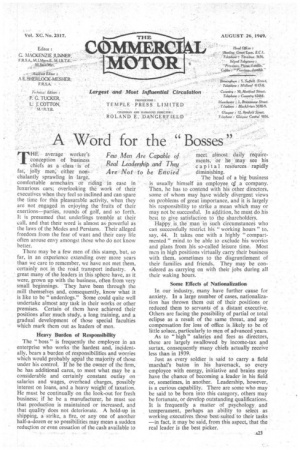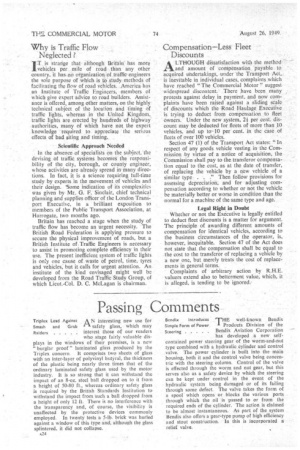A •Word for the " Bosses "
Page 25

Page 26

If you've noticed an error in this article please click here to report it so we can fix it.
HE average worker's Few Men Are Capable of conception of business • chiefs as •a class is of Real Leadership and They fat," jolly met4 either nonAre Not -to be Eneied chalantly sprawling in large, comfortable armchairs ' or riding in ease in•luxurious cars; overlooking the work of their executives when they feel so inclined and can spare the time for this pleasurable activity, when they are not engaged in enjoying the fruits of their exertions—parties, rounds of golf, and so forth. It is presumed that underlings tremble at their and that their word is almost aspowerful as the laws of the Medes and Persians. Their alleged freedom from the fear of want and their easy life often arouse envy amongst those who do not know better.
There may be a few men of this stamp, but, so far, in an experience extending over more year than we care to remember, we have not met them, certainly not in the road transport industry. A great many of the leaders in this sphere have, as it were, grown up with the business, often from very small beginnings. They have been through the mill themselves and, consequently, know what it is like to be "underdogs." Some could quite well undertake almost any task in their works or other premises. Certain of them have achieved their positions after much study, a long training, and a gradual development of those special faculties which mark them out as leaders of men.
Heavy Burden of Responsibility The " boss " is frequently the employee in an enterprise who works the hardest and, incidentally, bears a burden of responsibilities and worries which would probably appal the majority of those under his control. If he be the owner of the firm, he has additional cares, to meet what may be a considerable and certainly constant outlay on salaries and wages, overhead charges, possibly interest on loans, and a heavy weight of taxation. He must be continually on the look-out for fresh business; if he be a manufacturer, he must see that production is maintained or increased, and that quality does not deteriorate. A bold-up in shipping, a strike, a fire, or any one of another half-a-dozen or so possibilities may mean a sudden reduction or even cessation of the cash available to The head of a big business is usually himself an employee, ch,f a company. Then, he has to contend with his other directors, some of whom may have widely divergent views on problems of great importance, and it is largely his responsibility to strike a mean which may or may not be successful. In addition, he must do his best to give satisfaction to the shareholders. HaPpy, is the man in such circumstances who can successfully restrict his "working hours " to, say, 44. It takes one with a highly " compartmented " mind to be able to exclude his worries and plans from his so-called leisure time. Most men in high positions virtually carry their business with them, sometimes to the disgruntlement of their families and friends. They may be considered as carrying on with their jobs during all their waking hours.
Some Effects of Nationalization In our industry, many have further cause for anxiety. In a large number of cases, nationalization has thrown them out of their positions or reduced them to servants of a distant executive. Others are facing the possibility of partial or total eclipse as a result of the same threat, and any compensation for loss of office is likely to be of little solace, particularly to men of advanced years.
As to " high " salaries and fees as directors, these are largely swallowed by income-tax and surtax, consequently many chiefs actually receive less than in 1939.
Just as every soldier is said to carry a field marshal's baton in his haversack, so every employee with energy, initiative and brains may have the chance of becoming a leader in his field or, sometimes, in another. Leadership, however, is a curious capability. There are some who may be said to be born into this category, others may be fortunate, or develop outstanding qualifications. It is frequently a matter of psychology and temperament, perhaps an ability to select as working executives those best, suited to their tasks —in fact, it may be said, from this aspect, that the real leader is the best picker.
Why is Traffic Flow Neglected
IT is strange that although Britain has more
vehicles per mile of road than any other eountry, it has-no organization of traffic engineers the sole purpose of which is to study methods of facilitating the flow of road vehicles. America has an Institute of Traffic Engineers, members of which give expert advice to road builders. Assistance is offered, among other matters, on the highly technical subject of the location and timing of traffic lights, whereas in the United Kingdom, traffic lights are erected by hundreds of highway authorities, many of which have not the expert knowledge required to appreciate the serious effects of bad siting and timing.
Scientific Approach Needed In the absence of specialists on the subject,-the devising of traffic systems becomes the responsibility of the city, borough, or county engineer, whose activities are already spread in many directions. In fact, it is a science requiring lull-time study by experts in the movement of vehicles and their design. 'Some indication of its complexities was given by Mr. G. F. Sinclair, chief technical planning and supplies officer of the London Trans. port Executive, in a brilliant exposition to members of the Public Transport Association, at Harrogate, two months ago.
Britain has reached a stage when the study of traffic flow has become an urgent necessity. The British Road Federation is applying pressure to secure the physical improvement of roads, but a British Institute of Traffic Engineers is necessary to assist in promoting complete efficiency in their use. The present inefficient system of traffic lights is or4 one cause of waste of petrol, time, tyres and vehicles, but it calls for urgent attention. An institute of the kind envisaged might well be developed from the Road Traffic Study Group, of which Lieut.-Col. D. C. McLagan is chairman.
Compensation—Less Fleet Discounts
ALTHOUGH dissatisfaction with the method and amount of compensation payable to acquired nndertakings. under the Transport Act„ is inevitable in individual cases, complaints .which have reached "The Commercial Motor" suggest widespread discontent. There have been many protests against delay in payment, and now complaints have been raised against a sliding scale of discounts which the Road Haulage Executive is trying to deduct from compensation to fleet Owners. Under the new system, 2 per cent. discount may be deducted for fleets of more than 10 vehicles, and up to 10 per cent. in the case of
fleets of over 100 vehicles. '
Section 47 (1) of the Transport Act states: "In respect of any goods vehicle vesting inthe Commission by virtue of a notice of acquisition, the Commission shall pay to the transferor compensation equal to the cost, as at the date of transfer, of replacing the vehicle by a new vehicle of a similar type . . ." Then follow provisions for assessing depredation, and for adjusting compensation according to whether or not the vehicle be materially better or worse in condition than the normal for a machine of the same type and age.
Legal Right in Doubt Whether or not the Executive is legally entitled to deduct fleet discounts is a matter for argument. The principle of awarding different amounts of compensation for identical vehicles, according to the business circumstances of the operator, is. however, inequitable. Section 47 of the Act does not state that the compensation shall be equal to the cost to the transferor of replacing a vehicle by a new one, but merely treats the cost of replacements in general terms.
Complaints of arbitrary action by R.H.E. valuers extend also to betterment value, which, it is alleged, is tending to be ignored.
•




















































































